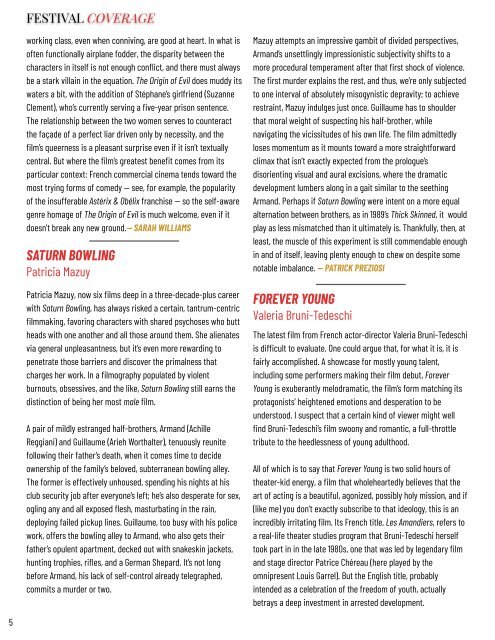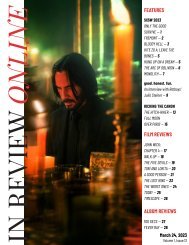InRO Weekly — Volume 1, Issue 10
Create successful ePaper yourself
Turn your PDF publications into a flip-book with our unique Google optimized e-Paper software.
FESTIVAL COVERAGE<br />
working class, even when conniving, are good at heart. In what is<br />
often functionally airplane fodder, the disparity between the<br />
characters in itself is not enough conflict, and there must always<br />
be a stark villain in the equation. The Origin of Evil does muddy its<br />
waters a bit, with the addition of Stéphane’s girlfriend (Suzanne<br />
Clement), who’s currently serving a five-year prison sentence.<br />
The relationship between the two women serves to counteract<br />
the façade of a perfect liar driven only by necessity, and the<br />
film’s queerness is a pleasant surprise even if it isn’t textually<br />
central. But where the film’s greatest benefit comes from its<br />
particular context: French commercial cinema tends toward the<br />
most trying forms of comedy <strong>—</strong> see, for example, the popularity<br />
of the insufferable Astérix & Obélix franchise <strong>—</strong> so the self-aware<br />
genre homage of The Origin of Evil is much welcome, even if it<br />
doesn’t break any new ground.<strong>—</strong> SARAH WILLIAMS<br />
SATURN BOWLING<br />
Patricia Mazuy<br />
Patricia Mazuy, now six films deep in a three-decade-plus career<br />
with Saturn Bowling, has always risked a certain, tantrum-centric<br />
filmmaking, favoring characters with shared psychoses who butt<br />
heads with one another and all those around them. She alienates<br />
via general unpleasantness, but it’s even more rewarding to<br />
penetrate those barriers and discover the primalness that<br />
charges her work. In a filmography populated by violent<br />
burnouts, obsessives, and the like, Saturn Bowling still earns the<br />
distinction of being her most male film.<br />
A pair of mildly estranged half-brothers, Armand (Achille<br />
Reggiani) and Guillaume (Arieh Worthalter), tenuously reunite<br />
following their father’s death, when it comes time to decide<br />
ownership of the family’s beloved, subterranean bowling alley.<br />
The former is effectively unhoused, spending his nights at his<br />
club security job after everyone’s left; he’s also desperate for sex,<br />
ogling any and all exposed flesh, masturbating in the rain,<br />
deploying failed pickup lines. Guillaume, too busy with his police<br />
work, offers the bowling alley to Armand, who also gets their<br />
father’s opulent apartment, decked out with snakeskin jackets,<br />
hunting trophies, rifles, and a German Shepard. It’s not long<br />
before Armand, his lack of self-control already telegraphed,<br />
commits a murder or two.<br />
Mazuy attempts an impressive gambit of divided perspectives,<br />
Armand’s unsettlingly impressionistic subjectivity shifts to a<br />
more procedural temperament after that first shock of violence.<br />
The first murder explains the rest, and thus, we’re only subjected<br />
to one interval of absolutely misogynistic depravity; to achieve<br />
restraint, Mazuy indulges just once. Guillaume has to shoulder<br />
that moral weight of suspecting his half-brother, while<br />
navigating the vicissitudes of his own life. The film admittedly<br />
loses momentum as it mounts toward a more straightforward<br />
climax that isn’t exactly expected from the prologue’s<br />
disorienting visual and aural excisions, where the dramatic<br />
development lumbers along in a gait similar to the seething<br />
Armand. Perhaps if Saturn Bowling were intent on a more equal<br />
alternation between brothers, as in 1989’s Thick Skinned, it would<br />
play as less mismatched than it ultimately is. Thankfully, then, at<br />
least, the muscle of this experiment is still commendable enough<br />
in and of itself, leaving plenty enough to chew on despite some<br />
notable imbalance. <strong>—</strong> PATRICK PREZIOSI<br />
FOREVER YOUNG<br />
Valeria Bruni-Tedeschi<br />
The latest film from French actor-director Valeria Bruni-Tedeschi<br />
is difficult to evaluate. One could argue that, for what it is, it is<br />
fairly accomplished. A showcase for mostly young talent,<br />
including some performers making their film debut, Forever<br />
Young is exuberantly melodramatic, the film’s form matching its<br />
protagonists’ heightened emotions and desperation to be<br />
understood. I suspect that a certain kind of viewer might well<br />
find Bruni-Tedeschi’s film swoony and romantic, a full-throttle<br />
tribute to the heedlessness of young adulthood.<br />
All of which is to say that Forever Young is two solid hours of<br />
theater-kid energy, a film that wholeheartedly believes that the<br />
art of acting is a beautiful, agonized, possibly holy mission, and if<br />
(like me) you don’t exactly subscribe to that ideology, this is an<br />
incredibly irritating film. Its French title, Les Amandiers, refers to<br />
a real-life theater studies program that Bruni-Tedeschi herself<br />
took part in in the late 1980s, one that was led by legendary film<br />
and stage director Patrice Chéreau (here played by the<br />
omnipresent Louis Garrel). But the English title, probably<br />
intended as a celebration of the freedom of youth, actually<br />
betrays a deep investment in arrested development.<br />
5
















